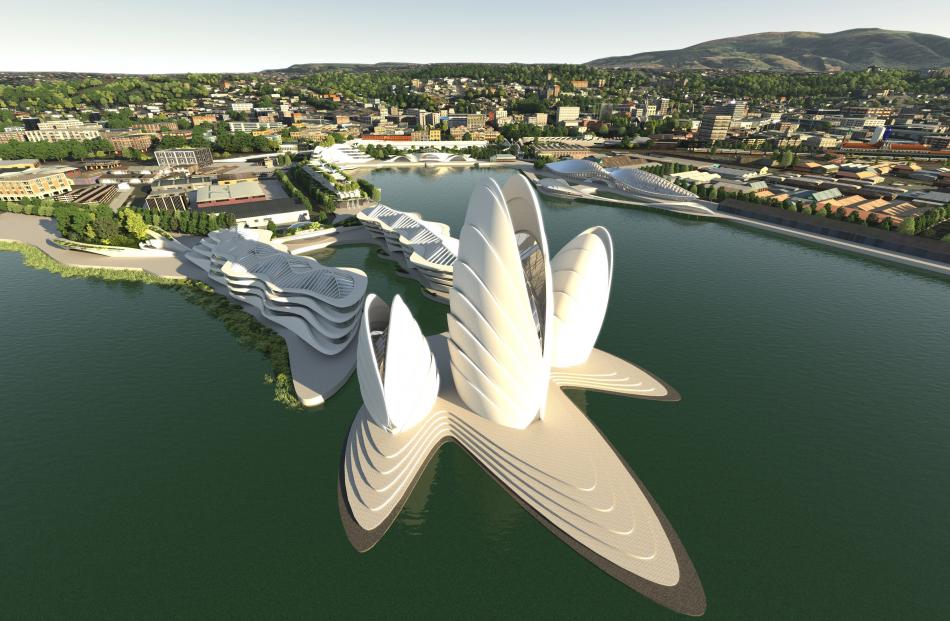
The Dunedin City Council has just released its draft 10-year plan, "Investing in our great small city'', outlining our vision for Dunedin over the next decade.
As you may already be aware, the plan proposes some big new projects such as an architectural bridge that will open up access to Dunedin's waterfront - the first step in a bold vision to transform the area and take advantage of the wonderful potential of our harbour environs.
We are also promoting major upgrades to the central city and tertiary precinct areas, which will combine necessary replacement of ageing underground infrastructure with above-ground improvements aimed at making these areas safer, more accessible, vibrant and people-friendly.
Of course, we also plan to keep providing, maintaining and improving all the ``business as usual'' services that keep the city ticking over - things like drinking water, roads and rubbish collection.
We must also improve core infrastructure to adapt to challenges such as climate change, including $35million for significant stormwater improvements in South Dunedin over the coming years. We've budgeted $44million to upgrade the Green Island wastewater treatment plant. This will help to reduce wastewater flooding in South Dunedin.
Other big projects include $20million budgeted for roading and footpath improvements across the network, $6.4million towards a new swimming pool in Mosgiel and $5.25million on a permanent community hub and library in South Dunedin.
All of this is about making Dunedin a more attractive place to live, work, study and do business. Dunedin is competing with other cities and regions for new people, jobs and businesses. We won't attract them if the city isn't increasingly vibrant and appealing to families, job seekers and employers.

For example, the environment strategy's goals of a resilient and zero-carbon city provide opportunities to grow a cleaner, smarter economy, while also providing a more accessible and efficient transport network, improving social wellbeing through better housing and energy use, and looking after and enhancing spaces for the recreational activities we hold so dear.
Much effort, thought and even anguish has gone into this plan and making sure it delivers on our overarching vision of Dunedin becoming one of the world's great small cities.
Of course, considerable investment is required to achieve all of these things. This is reflected in next year's proposed rates increase of 7.3%. We will also have to raise debt to help fund some projects and we're looking at selling some commercial property we own outside of Dunedin to raise funds and offset costs.
Clearly, this is a change from the council's financial strategy over the past six years, where we focused on paying off debt while keeping rates as low as possible. The council was very successful with that.
But we can't do the things we know we need to do and that the community wants, and continue to hold rates rises at 3% and reduce debt at the same time.
The city is already humming with economic activity, creativity, aspiration and promise. Recent statistics show a net gain of over 840 jobs in the year to March 2017, while the population grew by 1800 in the year to June 2017.
Dunedin's recent resurgence is based on a more outward-looking focus; greater appreciation and preservation of our proud built heritage and stunning natural environment; increased showcasing of our vibrant arts and culture scene to the globe; capitalising on our world-class facilities to host major events and conferences; and growing the leading-edge primary, science and technology industries which flow out of our prestigious tertiary institutions.
But we have to take advantage of that momentum, continue to build on our strengths and, from the council's perspective, invest ratepayers' money in things that will add value to our city.
The ambitious and considered programme of spending outlined in the draft plan is an investment in the city - not only for your benefit, but to ensure a benefit for your children and grandchildren as well.
Plan at a glance
●$864m capital expenditure
●Feedback: March 14-April 23
●Consultation document delivered to homes from March 19
●Submit online at www.dunedin.govt.nz/10-year-plan
●Hearings: April 9-13
●Final plan approved: June 26
Comments
Mayor Cull says these various expenditures are 'what the community wants' but this is not the whole story. Various groups and sectors in the city are always going to the DCC asking for financial support and funding for their own special projects. None of these groups ever look at the big picture, the overall and total spending which comes from ratepayers - in other words those who own property in the city. A unfair system when those who don't pay rates can aggressively lobby council to spend other people's money - a poll tax would be fairer. And the fact that democracy can so often amount to a popularity contest promotes excessive spending - in other words, lobby groups effectively say to elected reps, "Give us what we want (spend public money on it) or we''ll make sure you get voted out next election.' And then there's the interpretation that saying 'No' is always negative, unadventurous and lacking in vision. But what one person calls 'bold' (and Mayor Cull uses the word here) another might call 'reckless'. Who is asking what the ratepayers of Dunedin can afford? No-one as far as I can see. No, the government rates subsidy will not help. Already at maximum for Super.
Public submissions close 23rd April. So I (like all other Dunedin residents) have got about 35 days to think about the direction I'd like the city to go in over the next 10 years.
I asked the DCC to keep rate increases under 3%. I wonder what would happen if lots of people did this in their DCC ten year plan submission.













